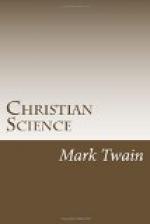The world must grow to the spiritual understanding of prayer. If good enough to profit by Jesus’ cup of earthly sorrows, God will sustain us under these sorrows. Until we are thus divinely qualified, and willing to drink His cup, millions of vain repetitions will never pour into prayer the unction of Spirit, in demonstration of power, and “with signs following.” Christian Science reveals a necessity for overcoming the world, the flesh and evil, and thus destroying all error.
Seeking is not sufficient. It is striving which enables us to enter. Spiritual attainments open the door to a higher understanding of the divine Life.
One of the forms of worship in Thibet is to carry a praying-machine through the streets, and stop at the doors to earn a penny by grinding out a prayer; whereas civilization pays for clerical prayers, in lofty edifices. Is the difference very great, after all?
Experience teaches us that we do not always receive the blessings we ask for in prayer.
There is some misapprehension of the source and means of all goodness and blessedness, or we should certainly receive what we ask for. The Scriptures say: “Ye ask, and receive not, because ye ask amiss, that ye may consume it upon your lusts.” What we desire and ask for it is not always best for us to receive. In this case infinite Love will not grant the request. Do you ask Wisdom to be merciful and not punish sin? Then “ye ask amiss.” Without punishment, sin would multiply. Jesus’ prayer, “forgive us our debts,” specified also the terms of forgiveness. When forgiving the adulterous woman He said, “Go, and sin no more.”
A magistrate sometimes remits the penalty, but this may be no moral benefit to the criminal; and at best, it only saves him from one form of punishment. The moral law, which has the right to acquit or condemn, always demands restitution, before mortals can “go up higher.” Broken law brings penalty, in order to compel this progress.
Mere legal pardon (and there is no other, for divine Principle never pardons our sins or mistakes till they are corrected) leaves the offender free to repeat the offense; if, indeed, he has not already suffered sufficiently from vice to make him turn from it with loathing. Truth bestows no pardon upon error, but wipes it out in the most effectual manner. Jesus suffered for our sins, not to annul the divine sentence against an individual’s sin, but to show that sin must bring inevitable suffering.
Petitions only bring to mortals the results of their own faith. We know that a desire for holiness is requisite in order to gain it; but if we desire holiness above all else, we shall sacrifice everything for it. We must be willing to do this, that we may walk securely in the only practical road to holiness. Prayer alone cannot change the unalterable Truth, or give us an understanding of it; but prayer coupled with a fervent habitual desire to know and do the will of God will bring us into all Truth. Such a desire has little need of audible expression. It is best expressed in thought and life.




